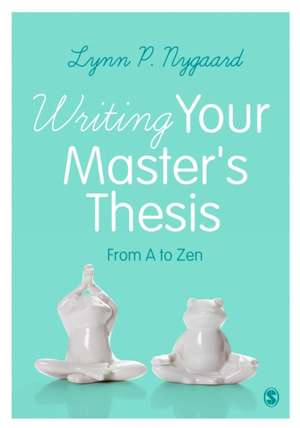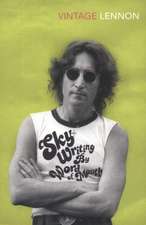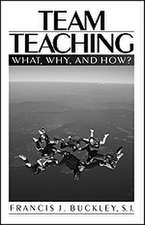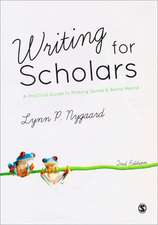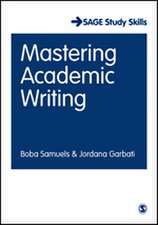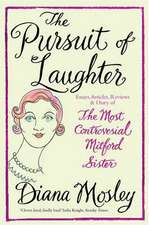Writing Your Master's Thesis: From A to Zen
Autor Lynn Nygaarden Limba Engleză Paperback – 6 mar 2017
Using real-world cases, student vignettes, and reflective questions, Lynn leads you through the A to Zen of the writing process, building your confidence as well as developing your skills.
Find out how to:
- Understand yourself, your audience, and your project, so you better understand your role in communicating research
- Choose a question and plan an appropriate design
- Build a foundation of ethics and background research into your writing practice
- Find your own writing (life)style
- Work with your supervisor, so you can get the best from the relationship
- Navigate structure, arguments, and theory, for deeper critical engagement
- Contextualize your research and maximize its impact.
Going beyond the standard ‘how to survive’ advice, this inspiring writing guide empowers you to develop the voice, tone, and critical engagement required for you to thrive at Master’s level
SAGE Study Skills are essential study guides for students of all levels. From how to write great essays and succeeding at university, to writing your undergraduate dissertation and doing postgraduate research, SAGE Study Skills help you get the best from your time at university. Visit the SAGE Study Skills hub for tips, resources and videos on study success!
| Toate formatele și edițiile | Preț | Express |
|---|---|---|
| Paperback (1) | 268.73 lei 6-8 săpt. | |
| SAGE Publications – 6 mar 2017 | 268.73 lei 6-8 săpt. | |
| Hardback (1) | 649.87 lei 6-8 săpt. | |
| SAGE Publications – 6 mar 2017 | 649.87 lei 6-8 săpt. |
Preț: 268.73 lei
Nou
51.43€ • 53.49$ • 42.46£
Carte tipărită la comandă
Livrare economică 12-26 aprilie
Specificații
ISBN-10: 1473903939
Pagini: 224
Dimensiuni: 184 x 246 x 15 mm
Greutate: 0.39 kg
Ediția:First Edition
Editura: SAGE Publications
Colecția Sage Publications Ltd
Locul publicării:London, United Kingdom
Recenzii
The distinctive focus of this ground-breaking study skills book is on the beginner thesis-writer as an individual shaped by experience-based academic assumptions and desires. From this perspective conventional assessment criteria can be transformed into a pedagogically helpful conversation with different readers.
What makes this book unique is how every step of the writing process is framed to engage the writer’s awareness. Thesis writing, under Nygaard’s guidance, becomes an experience of discovery and self-realization. It’s invaluable for students aiming for an academic career.
This book is many things: interactive, multi-dimensional, technical, philosophical, and incredibly witty. Packed with valuable life-lessons, it demystifies academic writing and shows you how best to communicate topics outside of your own head, department, or community.
Cuprins
2.From topic to question to design: Planning your journey
3.Ethics: Making good choices
4.You are what you read: Building a foundation of knowledge
5.Writing as thinking: From rough draft to final document
6.Supervision and guidance: Getting help along the way
7.Structure and argument: What’s the logic of your story?
8.Your introduction: How do you fit into the conversation?
9.Your theoretical and conceptual framework: What ideas are you using?
10.Your method: What did you do to answer your question?
11.Your results and analysis: What are you building your argument on?
12.Your discussion and conclusion: So, what does all this mean?
13.The finishing touches: Polishing and submitting your work
Notă biografică
Since moving to Norway from the US in the late 1980s, Lynn P. Nygaard has provided editorial support, writing instruction, and coaching for researchers in a wide variety of disciplines. A native English speaker, Nygaard started as a freelance copyeditor and translator for Norwegian academics aiming to publish their work in international journals. In 2000, she became the editorial advisor at the Center for International Climate and Environmental Research ¿ Oslo (CICERO). This position allowed her to view researchers and the writing process from close quarters, and she discovered that language was seldom the main explanation for what was going wrong. After several years of leading workshops on academic writing that focused on developing an awareness of audience, formulating the core argument, and structuring the story, she published Writing for Scholars: A Practical Guide to Making Sense and Being Heard (originally published by Universitetsforlaget in 2008, and published in a second edition by Sage and Universitetsforlaget in 2015). In 2008, she became a special advisor at the Peace Research Institute Oslo (PRIO), and continues to develop her expertise in how to support scholars through the writing process. With an undergraduate degree in women¿s studies from the University of California at Berkeley and a graduate degree in political science at the University of Oslo, she is currently pursuing a doctorate in education from the Institute of Education, University College London, focusing on research productivity, academic writing, and gender gaps in academia.
